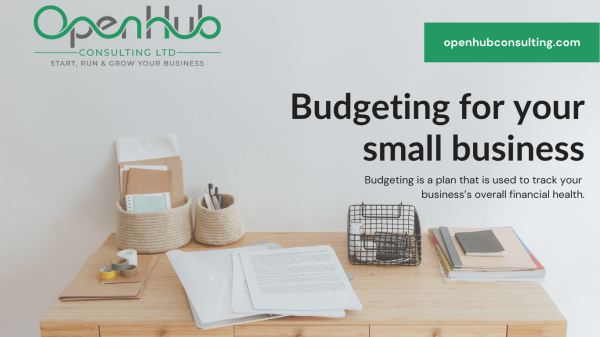When it comes to budgeting, small businesses often forget about a few key aspects. You’ve got a small business, but it’s not a bean counter. You’ve got to keep your eyes on the ball … and your budget. Create a budget for your business and stick to it.
The key to a successful budget is ensuring that you spend money on areas that will help you achieve your business objectives.
For example, a budget for your business may include:
If this article helped you, you can support our work at OpenHub.
Support OpenHub Digital1) Marketing – to promote your business and attract new clients.
2) Administration – to help you manage day-to-day operations.
3) Investment – to fund any necessary growth or expansion.
4) Profit – to pay yourself and cover any other expenses.
There are a variety of different ways to create a budget for your small business.
1. Master budget
A master budget is a financial plan that is used to organize all of your financial information. This includes details on your income and expenses, as well as your short- and long-term financial goals.
It is a budget that is used for all accounting activities. This includes general ledger accounts, journal entries, depreciation, auditing, and the like. A Master budget may also be used for forecasting, planning, and other activities that are common to all businesses.
2. Operating budget
An operating budget is a projection of your business’s monthly expenses. The operating budget is a very important activity that you should keep tracking, as it serves as a guideline for managing your finances. It is also critical because it helps you make decisions about what to spend money on.
It is a plan that is used to track your actual spending. This budget is updated on a monthly basis and is used to make decisions about how to spend your money.
3. Cash flow budget
A cash flow budget is a plan that is used to track your business’s actual cash flow. This budget is updated on a regular basis and is used to make decisions about how to spend your money.
In accounting, a cash flow budget is a prediction of cash inflows and outflows for a given period of time. It is most typically used in business and financial planning, but is also useful for personal purposes.
4. Financial budget
A financial budget is an accounting tool that helps you plan and control your finances. It can help you to see where your money is going, and where it should be going in the future.
It can be helpful to look at your income and expenses for a month or a year, and then set a budget that you can follow. This means that you only spend money on the things that you can afford, and it means that you don’t spend more than you earn.
It is a plan that is used to track your business’s overall financial health. This budget is updated on a regular basis and is used to make decisions about how to spend your money.
If this article helped you, you can support our work at OpenHub.
Support OpenHub Digital5. Static budget
A static budget is an estimate of how much revenue a company can expect to generate over a given period of time. It is usually measured in terms of a percentage of the company’s sales.
It is a plan that is used to track your business’s long-term financial health. This budget is updated on a regular basis and is used to make decisions about how to spend your money.
Read Also:
– How to Make a Budget for Your Business
– 2022 Year-end Accounting Checklist
– Year-end Accounting – Put together necessary paperwork
– Follow-up Unpaid Invoices – Year-end Accounting
The first step to budgeting for your small business is to define what you need to do in order to be successful. Once you have defined your goals, you can then start to create a budget that will help you achieve them. Here are three basic steps to create a budget:
1) Define the goals of your business.
2) Create a budget for each of the key areas of your business.
3) Set a monthly budget for each of your key areas.
Small businesses need to plan their money carefully, because unlike large companies, there are more expenses that can be controlled by the owner. The owner needs to know exactly what each dollar is going to be spent on, and where it’s coming from.
Budgeting is essential to small businesses because it allows you to plan ahead and make sure you have enough money to cover your expenses for the next month. Without budgeting, it’s easy to make mistakes, such as overspending or underspending.
From Insight to Implementation
Going through the administrative and legal landscape in Cameroon requires more than just information—it requires a grounded local partner. At OpenHub Consulting, we specialize in helping the diaspora and international investors turn their business visions into compliant, operational realities.
If you are ready to move forward, our team is prepared to manage your registration and compliance from start to finish.
Start Your Company Incorporation →Discover more from OpenHub Digital
Subscribe to get the latest posts sent to your email.


One thought on “Budgeting for your small business”
Comments are closed.